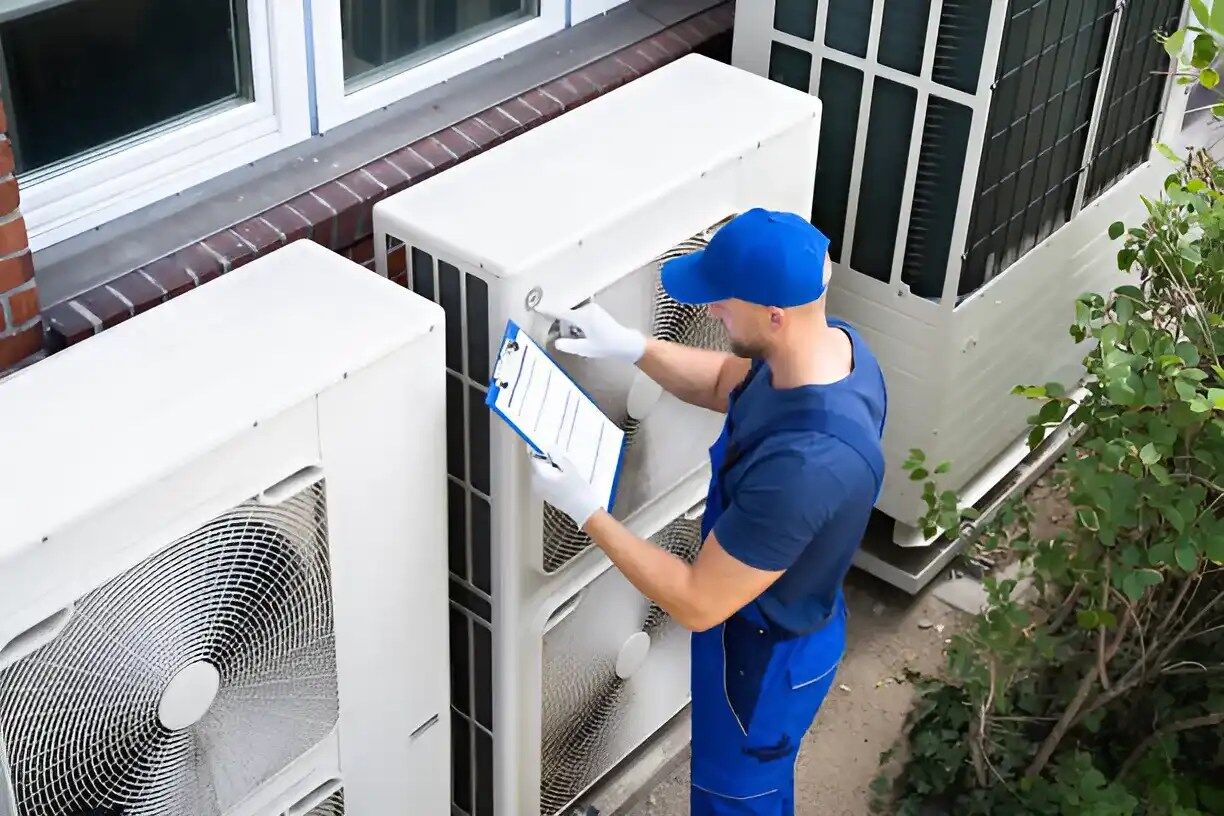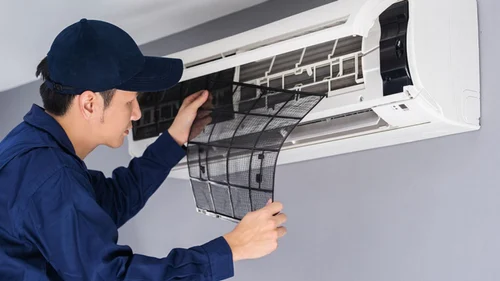The smart Trick of Ac Air Conditioner Repair That Nobody is Discussing
The smart Trick of Ac Air Conditioner Repair That Nobody is Discussing
Blog Article
The Basic Principles Of Ac Fixing
Air Conditioning Repair: Professional Cooling System Repair Guarantees Your Home Remains Comfy Throughout The Year
Kinds Of Air Conditioner Systems
When tackling air conditioner repair work, understanding the type of a/c system you're dealing with can conserve time, cash, and stress. Ever wondered why some systems cool a room quicker than others? Or why particular systems seem to break down more regularly? Let's peel back the layers.
Central Air
Fix Air Conditioner Fundamentals Explained
Envision a cool breeze flowing through an entire house, whispering comfort into every corner. Central air conditioning systems do precisely that. They utilize a network of ducts to disperse cooled air, depending on a compressor and condenser outside, coupled with an evaporator coil inside. When this complex beast fails, determining the concern can be like discovering a needle in a haystack.
Split Systems

Split systems are a popular choice for numerous homes-- part indoor system, part outdoor compressor. They provide flexibility and efficiency, however their double nature means repair work can involve either part. Have you ever heard a strange sound outside your home just to find the indoor unit isn't cooling? That's a traditional indication of a split system problem.
Repair Air Conditioner Near Me - Truths
Window Units
These compact warriors fight summer heat by fitting comfortably into a window frame. They combine all components into a single box. Their simplicity typically indicates less repair headaches, however ignoring filters or enabling debris accumulation can result in decreased performance or breakdowns.
Ductless Mini-Splits
How Air Conditioner Repair Near Me can Save You Time, Stress, and Money.
Ductless systems bypass ductwork totally, making them ideal for homes without existing ventilation. They're peaceful, efficient, and surprisingly resilient. When repair work are needed, professionals must be adept at dealing with refrigerant lines and electrical connections-- no little accomplishment.
Quick Referral Table
| Type | Key Features | Common Repair Issues |
|---|---|---|
| Central Air | Ductwork, whole-house cooling | Duct leaks, compressor failure |
| Split System | Indoor & & outside systems | Refrigerant leaks, fan motor problems |
| Window System | All-in-one, easy setup | Filthy filters, electrical faults |
| Ductless Mini-Split | No ducts, zoned cooling | Line leakages, sensor malfunctions |
Fix Air Conditioner Can Be Fun For Anyone
Deciphering the Most Regular AC Issues
Have you ever wondered why your air conditioner unexpectedly stops cooling throughout a sweltering afternoon? One common read more offender is an unclean or blocked air filter. This sly villain limits airflow, requiring your system to work overtime, which not just minimizes performance but can also cause early breakdowns. Think of attempting to breathe through a headscarf soaked in dust-- it's exhausting!
Another frequent misstep is refrigerant leakages. These invisible leaks do not just decrease cooling power but can also harm the compressor, the heart of your air conditioning unit. How frequently do you check for unusual hissing noises or ice formation on the coils? Capturing these indications early can save you from costly repairs down the line.
Beyond the Fundamentals: Lesser-Known Issues
The Of Fix Air Conditioner
Often, the thermostat itself is the nuisance. Miscalibrated or defective thermostats send blended signals, causing the AC to cycle unpredictably. Ever skilled your AC turning on and off in rapid succession? That's called short biking, a sneaky efficiency drainer that can wear elements faster than you 'd anticipate.
Electrical problems, such as worn circuitry or a malfunctioning capacitor, may prowl underneath the surface area. AC Repair. These frequently manifest as AC systems failing to start or all of a sudden shutting down. A professional eye knows to evaluate these elements with accuracy tools, something a casual look will not expose
Expert Tips for Diagnosing Common A/c Problems
Fix Air Conditioner Can Be Fun For Anyone
- Check and change air filters frequently-- every 1 to 3 months depending on usage and environment.
- Listen for uncommon sounds like rattling or buzzing that could signal loose parts or electrical faults.
- Examine the outside system for particles or obstructions that hinder air flow and cause overheating.
- Try to find frost accumulation on evaporator coils, a hint towards refrigerant issues or air flow restrictions.
- Test the thermostat settings and recalibrate if the temperature level readings feel off.
Quick Referral Table: Manifestation & & Probable Triggers

| Symptom | Probable Cause | Expert Tip |
|---|---|---|
| Warm air blowing | Low refrigerant or filthy coils | Clean coils and look for leakages right away |
| Short cycling | Thermostat issues or extra-large unit | Adjust thermostat settings and seek advice from sizing standards |
| System will not begin | Electrical faults or capacitor failure | Test circuitry and change capacitors as needed |
| Water leakage | Clogged drain line or frozen evaporator | Clear drain lines and inspect for coil icing |
DO IT YOURSELF Air Conditioner Maintenance Tips
Air Conditioning Repair Near Me - Questions
Ever seen your air conditioning unit sputtering like an old engine on a hot summer day? Ignoring subtle indications typically means more than simply a sweaty afternoon-- it's a start to unanticipated air conditioning repair work costs. However what if you could capture those whispers before they turn into wails? Regular do it yourself upkeep can be your first line of defense.
Easy Actions to Keep Your A/c Running Efficiently
3 Easy Facts About Air Conditioning Repair Shown
- Clean or Replace Filters: A clogged up filter resembles attempting to breathe through a headscarf. Every 1-3 months, examine and swap out your filters. It enhances airflow and performance, preventing compressor pressure.
- Examine the Condenser Coils: Dust and particles serve as undetectable blankets smothering your system's cooling power. Gently brush or vacuum the coils, but prevent severe chemicals that might erode the metal.
- Examine the Drain Line: When was the last time you peeked at your drain pan? A blocked drain can cause water leaks and foster mold growth. Flushing it with a vinegar solution monthly keeps the flow clear.
- Seal and Insulate: Are your ductworks whispering leaks? Sealing spaces with mastic or foil tape improves performance and minimize uneven cooling.
Pro Tips Beyond the Basics
- Measure your unit's voltage to catch subtle electrical wear before it sparks huge issues.
- Listen for unusual hums or rattles-- these acoustic breadcrumbs often indicate loose parts or stopping working motors.
- Keep outside units shaded however ensure a minimum of two feet of clearance around them for optimum air flow.
Ask yourself: Are you hearing your AC's quiet SOS or simply awaiting it to yell? Taking some time for DIY a/c upkeep changes reactive repair work into proactive care, conserving sweat, tension, and yes, cash.
Some Known Incorrect Statements About Air Conditioning Repair Near Me
Why Expertise in A/c Repair Work Matters
Imagine this: your air conditioning unit sputters and groans throughout a scorching afternoon, leaving you sweltering inside your home. Would you trust an amateur fumbling with delicate components, or would you seek the reassurance of a expert a/c specialist!.?.!? The complexities of modern air conditioning systems require precision and experience. A small miscalculation can escalate a small malfunction into a costly disaster.
The Greatest Guide To Ac Repair
Unseen Complexities Behind the Cool Breeze
Numerous ignore the layers hidden beneath the sleek outside of an air conditioning unit - Air Conditioner Repair Near Me. From refrigerant leaks that calmly drain efficiency to defective thermostats that misread temperatures, these concerns require more than a fundamental toolkit. Specialists have an eager eye for identifying problems that balance homeowners ignore
Vital Tips for Choosing the Right Professional
Unknown Facts About Air Conditioner Repair Near Me
- Certification and Training: Confirm credentials; a service technician trained in the most current heating and cooling innovations is indispensable.
- Experience with Specific Systems: Not all a/c units are developed equivalent; discover somebody knowledgeable about your model's peculiarities.
- Diagnostic Technique: Proficient service technicians use sophisticated tools-- like electronic leak detectors and thermal imaging-- to pinpoint covert faults.
What to Expect from a Pro's Diagnostic Process
| Step | Function | Expert Insight |
|---|---|---|
| Visual Examination | Identify obvious wear or damage | Search for corrosion or uncommon sounds-- a dead giveaway frequently overlooked |
| Pressure Testing | Find refrigerant leakages | Subtle pressure drops can hint at micro leakages undetectable to the naked eye |
| Electrical Testing | Ensure circuit integrity | Loose connections can imitate severe mechanical failures |
The Best Strategy To Use For Ac Repair Near Me
Why Do It Yourself Often Falls Short
Tempting as it is to tinker with your AC system, do it yourself fixes frequently miss out on the root cause. For example, topping off refrigerant might briefly cool your space but overlooks leaks that aggravate gradually. Professional specialists don't just patch signs; they pursue the underlying mechanical and electrical faults that sap efficiency.
Ac Air Conditioner Repair Can Be Fun For Anyone
Concerns to Ask Before Employing
- What diagnostic tools do you use to determine problems?
- Can you describe the repair work procedure and expected outcomes?
- Are you familiar with the refrigerants compatible with my unit?
- Do you follow safety procedures for handling electrical components?